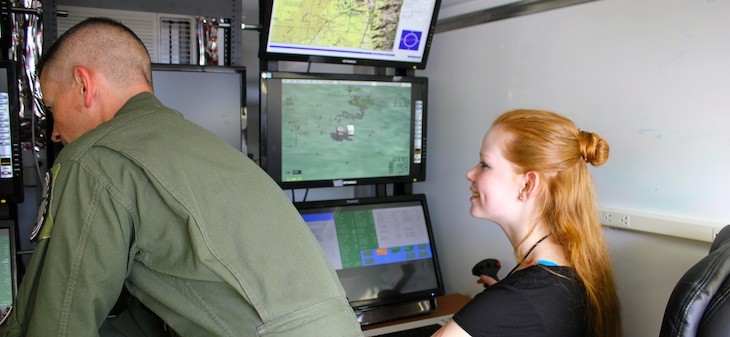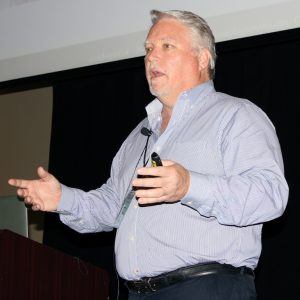New pregnancy test, trucking tech and Air Guard general part of NWA TechFest
by May 19, 2017 1:30 pm 962 views

Arkansas Air National Guard Master Sgt. J.T. Greer uses a control center simulator to show Bentonville High School student Faith Pearrow how to maneuver a remotely piloted aircraft. The simulator was part of the NWA TechFest held in Fayetteville on May 18.
NowDiagnostics CEO Kevin Clark said he didn’t intend for the company’s AdexusDx pregnancy test to become an over-the-counter product, until an acting director of medical devices at the Food & Drug Administration personally encouraged it.
Now, the OTC application process is underway with the FDA, Clark said in a keynote speech to developers and others in the tech world at NWA TechFest on Thursday (May 18) at the Fayetteville Town Center. In its fifth year, TechFest is a conference “for geeks, by geeks,” according to its website.
Blood-based pregnancy tests are more sensitive and accurate than urine-based tests, and the FDA executive pointed to an onrush of people seeking pregnancy blood tests in emergency rooms and doctors’ offices throughout the country in the last few years, since health insurance and Medicaid coverage expanded, Clark said.
The pregnancy blood test is also awaiting CLIA waiver approval before it can be commercialized to be used widely in medical facilities in the U.S.
“The CLIA waiver shows your test is simple enough that any professional can run it and get the right results,” Clark said. That includes nurses and other personnel.
“The toughest hurdle is proving that it is simple enough that any layman can do that,” he said, regarding the path to OTC.
The Springdale-based company was founded in 2014 and has raised $25 million in capital. Clark said each time he has set out to raise money, the result has beaten expectations. He credits a number of factors for that.

“We put a great team together, and we believe we have a good concept,” Clark said. “Also, having a prototype that works: that’s huge. Then people can visualize it. They can understand what you’re doing. They can see there’s a need for it. It makes fundraising much easier.”
J.B. HUNT AND SENSOR TECHNOLOGY
Chris King, app developer for J.B. Hunt Transport Services, spoke at the TechFest on “Making Sense of Sensor Data.” The Lowell-based trucking company puts sensors to use on a daily basis, from trailer tracking to ensuring the right person is in the right truck, to gauging whether a shipment will arrive on time, based on layers of data, from fuel, to traffic, King said. He called it “predicting the future.”
The technology is also used in augmented reality, where a driver can use his or her smartphone to quickly collect data during pickup, simply by pointing its camera at a trailer, King said.
“J.B. Hunt is kind of turning slowly into a technology company,” King said.
Also at TechFest, Matt Shull, director of Aristotle Labs in Little Rock spoke to developers on the importance of site speed, especially when it comes to mobile.
“We use our phones for everything nowadays,” Shull said.
Web development, as a result, has to adapt, he said, adding, “You can’t push an elephant through a straw very quickly.”
The size of web pages affects the speed, so developers must be aware of how their clients’ images and other aspects of the pages will affect the end user experience. Developers should use that information to choose appropriate image file types, for example, and should know how to explain the distinction to clients, Shull said. A website has three seconds to make an impression on web surfers, he said.
3D PRINTING IN EDUCATION
Area K-12 schools are increasingly using 3D printing, said Drew Wallis, co-founder and director of sales and education at NWA3D. In addition to selling 3D printers, the company, founded in 2015, provides “unlimited training sessions and lifetime support” for printers sold to educational organizations, according to its website.
Wallis said he wants “to make it as easy as possible” for students and teachers.
James Hopper, national development coordinator for the EAST Initiative in Little Rock, said EAST students look for ways to solve problems through 3D printing. For example, a group from Don R. Roberts Elementary in Little Rock created a 3D-printed yearbook with busts of each senior high school student from the Arkansas School for the Blind.
Last Christmas, students at Buffalo Island Central High School in Monette designed a 3D-printed doll-sized replica of a crutch so a little girl with an autoimmune disease that causes her to walk with a crutch would have a doll that looked like her, Hopper said.
In addition to solving problems in the community, Wallis said, 3D printing presents a fundraising opportunity for students, who can print and sell objects, including fidget spinners, a popular toy.
Also at TechFest, Arkansas Air National Guard Brig. Gen. Tamhra Hutchins-Frye was the morning keynote speaker. Frye made history last year when she became the first female general of the Arkansas Air National Guard. On June 1, she is moving into a role in Washington, D.C., as nationwide director of manpower, personnel and services at the U.S. Air National Guard, and she is the first Arkansan to take on that role.
She also has served for an advocate for young women in science, technology, engineering and math fields, as co-chair of the planning committee for the Arkansas program, Girls of Promise.
At TechFest, Frye spoke on the opportunities for part-time work in the state’s Air Guard and how the program benefits area companies, because it pads the workforce with highly-trained and vetted individuals, she said.
